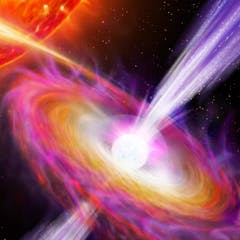
Articles on Satellites
Displaying 1 - 20 of 213 articles

The amount of space junk will increase as we continue to launch objects into space, but there are ways to curb damage on the ground.

Methane is a potent greenhouse gas that can leak from oil and gas wells, pipelines and landfills. Satellites can spot the releases fast enough to get them fixed and help protect the climate.

Space exploration is not a waste of resources, but a source of technological and medical advances, a tool for climate monitoring and a source of educational inspiration for youth.

The Starfish Prime test in 1962 showed how dangerous it would be to detonate a nuclear weapon in space.

The sky is becoming more cluttered with satellites and space junk. This is affecting astronomical study, but will only have a minor effect — if any — on the viewing of the solar eclipse.

New research reveals our understanding of dust’s role in the environment is far from settled.

Powerful jets are launched from the most massive objects in our universe, but we don’t fully understand how. This measurement gets us a step closer to solving the mystery.

Without satellites, we wouldn’t have much of the Earth and climate data we have today. And Australia is a world leader in satellite data.

We know particles from spacecrafts are in the stratosphere. But what this means for the ozone layer or the climate is still unknown.

Satellite photography of the Ukrainian city of Bakhmut shows block after block of destroyed buildings. Satellite radar provides a different view – a systematic look at the destruction of the whole city.

The capability for attacking satellites in space using cyber technology is advancing fast

Destroying satellites in space can lead to cascades that are hard to predict.

Russia isn’t likely to put nuclear missiles in space, but their reported anti-satellite weapon is just as alarming. An expert on nuclear strategy explains.

Megaconstellations of satellites are hindering the most powerful tool for space exploration: telescopes.

Despite what you may think, Australia has a long history of space activities. But this is the first time the Australian public has been asked its opinions on space.

Countries have submitted applications for hundreds of thousands of new satellites to be launched. The scale poses challenges for overcrowding orbit, with environmental and safety challenges.

Earth’s orbits are getting more and more crowded. To keep track of everything and avoid collisions and catastrophes, we need a new field: space domain awareness.

Starlink satellites emit bright, unintended and unexpected signals that can be detected by radio telescopes.

The combination of data and maps is useful for a lot more than just helping you get from point A to point B. Think natural disasters, global supply chains and climate change.

Treaties meant to ensure sustainability in space don’t currently regulate private companies, and not every country has signed on to an agreement for sustainable space exploration.





